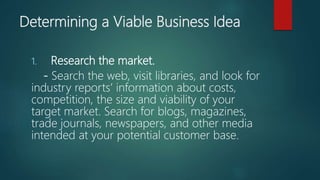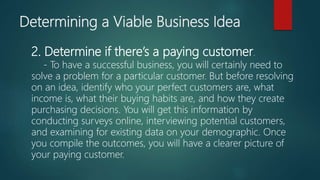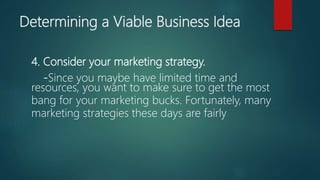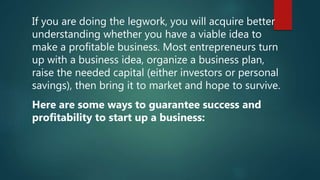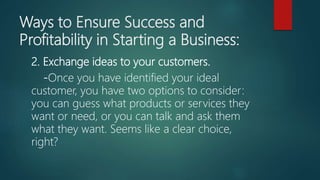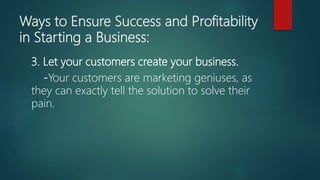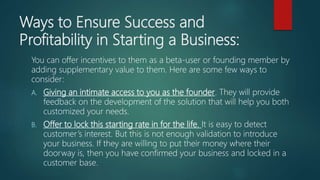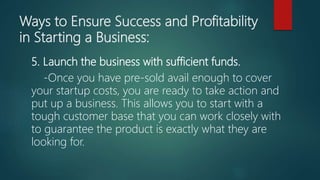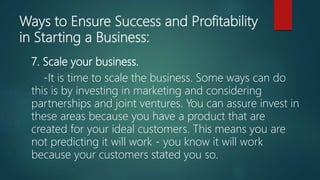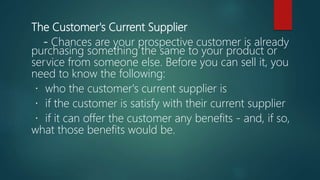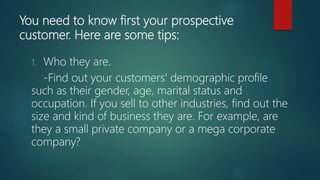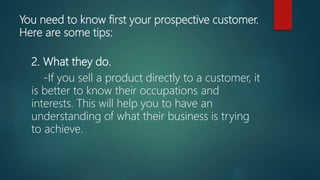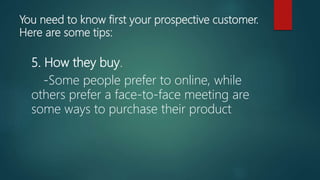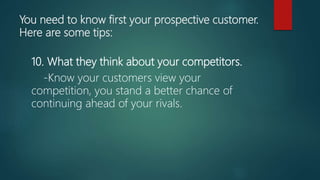ENTREPRENEURSHIP week 5-PPT.pptx
- 2. How do you verify your idea to work out whether your chosen businesses are often successful and support you achieve your career goal as an entrepreneur? Here are some processes to consider:
- 3. Determining a Viable Business Idea 1. Research the market. - Search the web, visit libraries, and look for industry reports’ information about costs, competition, the size and viability of your target market. Search for blogs, magazines, trade journals, newspapers, and other media intended at your potential customer base.
- 4. 2. Determine if there’s a paying customer. - To have a successful business, you will certainly need to solve a problem for a particular customer. But before resolving on an idea, identify who your perfect customers are, what income is, what their buying habits are, and how they create purchasing decisions. You will get this information by conducting surveys online, interviewing potential customers, and examining for existing data on your demographic. Once you compile the outcomes, you will have a clearer picture of your paying customer. Determining a Viable Business Idea
- 5. 3. Solicit honest feedback. -Bounce your business idea off of your family, friends, and peers to obtain some objective, real- advice. Ask to prospective customers, local storeowners, and even your competition (being not to bargain your idea) to acquire their take on fair pricing for your services and what they presently pay or charge for them. Determining a Viable Business Idea
- 6. 4. Consider your marketing strategy. -Since you maybe have limited time and resources, you want to make sure to get the most bang for your marketing bucks. Fortunately, many marketing strategies these days are fairly Determining a Viable Business Idea
- 7. Determining a Viable Business Idea 5. Evaluate the costs of your venture. -To make a sense of how many sales must be generated to hide your expenses and eventually bring in some cash, you will need to know how much it costs to run your business each month. The following may assist you assess to answer those questions.
- 8. Cost of materials. -How much will the cost of inventory, ingredients or product components? Cost of labor. -If you’re doing the work yourself, what is your time value? If you’re paying an employee, subcontractor or freelancer to work, how much time and money will it take that person to provide the product or services?
- 9. Overhead. -A part of your daily business expenses, like phone, electricity, rent, heat, insurance, water, accounting, legal, admin support and marketing, should be reflected in your pricing. Pricing. -Once you’ve calculated your costs, choose what you’re going to charge your customers. Remember, you must cover your costs and earn a profit on every sale or you will end up out of business quickly
- 10. If you are doing the legwork, you will acquire better understanding whether you have a viable idea to make a profitable business. Most entrepreneurs turn up with a business idea, organize a business plan, raise the needed capital (either investors or personal savings), then bring it to market and hope to survive. Here are some ways to guarantee success and profitability to start up a business:
- 11. Ways to Ensure Success and Profitability in Starting a Business: 1. Start by identifying a customer you want to attend. -Begin by classifying the people you want to wake up every day and trade your life to serve. This simple first phase will ensure you will feel fulfilled and satisfied as you begin an intense process of launching your business.
- 12. Ways to Ensure Success and Profitability in Starting a Business: 2. Exchange ideas to your customers. -Once you have identified your ideal customer, you have two options to consider: you can guess what products or services they want or need, or you can talk and ask them what they want. Seems like a clear choice, right?
- 13. Ways to Ensure Success and Profitability in Starting a Business: 3. Let your customers create your business. -Your customers are marketing geniuses, as they can exactly tell the solution to solve their pain.
- 14. Ways to Ensure Success and Profitability in Starting a Business: 4. Presell your product. - Identify the way you should charge for your solution. Remember, your customers are marketing geniuses. Ask them, “If I were to buy something like this to market, how much would this be?” Then ask them to pay for it upfront.
- 15. Ways to Ensure Success and Profitability in Starting a Business: You can offer incentives to them as a beta-user or founding member by adding supplementary value to them. Here are some few ways to consider: A. Giving an intimate access to you as the founder. They will provide feedback on the development of the solution that will help you both customized your needs. B. Offer to lock this starting rate in for the life. It is easy to detect customer’s interest. But this is not enough validation to introduce your business. If they are willing to put their money where their doorway is, then you have confirmed your business and locked in a customer base.
- 16. Ways to Ensure Success and Profitability in Starting a Business: 5. Launch the business with sufficient funds. -Once you have pre-sold avail enough to cover your startup costs, you are ready to take action and put up a business. This allows you to start with a tough customer base that you can work closely with to guarantee the product is exactly what they are looking for.
- 17. Ways to Ensure Success and Profitability in Starting a Business: 6. Create your MVP and let your customers develop it. -Your job is to get a minimum viable product (MVP) to your established members. If you have done a good job setting opportunities, members are expecting to give you feedback to enhance the product. Let them help you make it better! You will end up with an improved product, and they will feel emotionally secured to you and the solution.
- 18. Ways to Ensure Success and Profitability in Starting a Business: 7. Scale your business. -It is time to scale the business. Some ways can do this is by investing in marketing and considering partnerships and joint ventures. You can assure invest in these areas because you have a product that are created for your ideal customers. This means you are not predicting it will work - you know it will work because your customers stated you so.
- 19. If you are ready into entrepreneurship, follow some steps to assure your success and profitability. Knowing Your Customer Needs or Achieving Customer Requirements -Though good your product or service is, the simple truth is that no-one will buy it if they don't want or e they don't need it. You won't convince anyone that they want or need to buy unless you clearly understand what it is your customers really want.
- 20. Why do your customers need you? - Every business needs a purpose for their customers to purchase from them and not their competitors which is often called a Unique Sales Proposition (USP). Your USP can be acknowledged by completing the phrase "Customers will buy from me because my business is the only..."
- 21. The Customer's Current Supplier - Chances are your prospective customer is already purchasing something the same to your product or service from someone else. Before you can sell it, you need to know the following: who the customer's current supplier is if the customer is satisfy with their current supplier if it can offer the customer any benefits - and, if so, what those benefits would be.
- 22. You need to know first your prospective customer. Here are some tips: 1. Who they are. -Find out your customers' demographic profile such as their gender, age, marital status and occupation. If you sell to other industries, find out the size and kind of business they are. For example, are they a small private company or a mega corporate company?
- 23. You need to know first your prospective customer. Here are some tips: 2. What they do. -If you sell a product directly to a customer, it is better to know their occupations and interests. This will help you to have an understanding of what their business is trying to achieve.
- 24. You need to know first your prospective customer. Here are some tips: 3. Why they buy. -Knowing why customers buy a product or service can be easier to identify their needs to the benefits your business can offer.
- 25. You need to know first your prospective customer. Here are some tips: 4. When they buy. -Approaching a customer just at the time they want to buy, will massively increase your chances of success.
- 26. You need to know first your prospective customer. Here are some tips: 5. How they buy. -Some people prefer to online, while others prefer a face-to-face meeting are some ways to purchase their product
- 27. You need to know first your prospective customer. Here are some tips: 6. How much money they have. -Business can be more successful if you can match you’re offering to what you know your customer can afford.
- 28. You need to know first your prospective customer. Here are some tips: 7. What makes them feel good about buying. -If you know what makes them comfortable, you can serve them in the way they prefer.
- 29. You need to know first your prospective customer. Here are some tips: 8. What they expect of you. -For example, do not disappoint customers expecting reliable delivery from you, stand to gain repeat business.
- 30. You need to know first your prospective customer. Here are some tips: 9. What they think about you. -Customers likely to buy more if they enjoy dealing with you. And you can only solve problems if you know what they are.
- 31. You need to know first your prospective customer. Here are some tips: 10. What they think about your competitors. -Know your customers view your competition, you stand a better chance of continuing ahead of your rivals.


